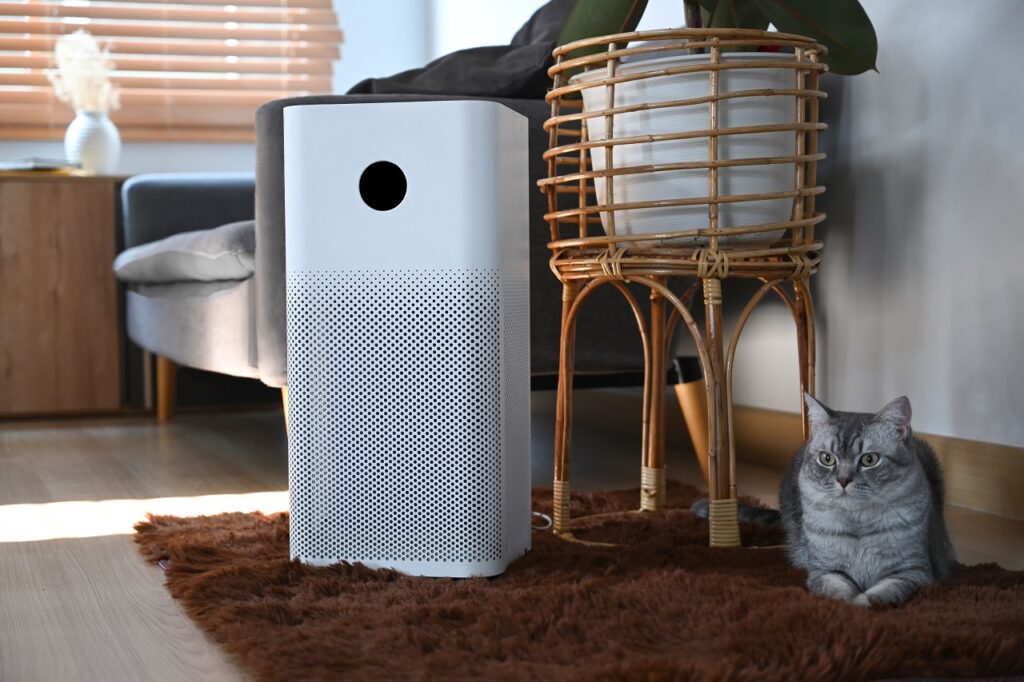Indoor air quality is an essential aspect of a healthy home environment, as it directly impacts our well-being, comfort, and overall quality of life. Poor air quality can result from numerous sources, including dust, pet dander, pollen, and other airborne contaminants, potentially leading to health issues such as allergies, asthma, and respiratory infections. One effective and proven solution for improving indoor air quality is investing in an air purifier, which efficiently filters and cleans the air we breathe.
As a full-service, licensed heating and air conditioning company, we are committed to assisting our customers in enhancing their indoor air quality and living environment. Our experienced technicians are well-versed in recommending, installing, and maintaining air purifiers, ensuring optimal performance and improved air quality for your home.
Join us as we explore the various types of air purifiers available, analyze how they work in purifying the air, and discuss the factors to consider when choosing the right air purifier for your home. Additionally, we will touch on the importance of maintaining your air purifier for optimal performance and the value of seeking professional guidance in selecting and installing these devices.
1. Types of Air Purifiers
Air purifiers come in various forms, each designed to target specific airborne pollutants and improve indoor air quality. Understanding the differences between them will help you select the best option for your needs:
– HEPA (High-Efficiency Particulate Air) Filters: HEPA filters are the gold standard in air purifiers, capable of capturing at least 99.97% of particles 0.3 microns in size or larger. These filters excel at capturing dust, pollen, mold spores, and other allergens commonly found in homes.
– Activated Carbon Filters: These filters use charcoal treated with oxygen, which enhances its ability to absorb a wide range of pollutants, including odors, smoke, and chemical fumes. Activated carbon filters are ideal for those seeking to reduce unpleasant smells and volatile organic compounds (VOCs).
– UV (Ultraviolet) Germicidal Irradiation: UV air purifiers use short-wavelength ultraviolet light to inactivate airborne pathogens, including bacteria, viruses, and mold. These systems can enhance overall indoor air quality by reducing infectious agents present in the air.
– Ionic Air Purifiers: Ionic purifiers use electrical charges to generate negative ions, which attach to airborne pollutants, making them too heavy to remain airborne. The particles then settle on surfaces or are collected by a filter, depending on the device design.
2. How Air Purifiers Work
Air purifiers improve indoor air quality by filtering out pollutants through various technologies suited to different contaminant types:
– Mechanical Filtration: In purifiers with HEPA filters, fans draw air into the device and through a filter, capturing pollutants. These filters require regular replacement to maintain optimal filtering efficiency.
– Adsorption: In activated carbon filters, the porous surface of the activated carbon attracts and traps pollutants, removing them from the air. As the filter saturates with collected substances, replacement becomes necessary.
– UV Irradiation: In UV air purifiers, ultraviolet light targets the DNA of microorganisms, rendering them inert and unable to reproduce. The UV-lamps in these purifiers require periodic replacement to ensure effectiveness.
– Ionization: In ionic air purifiers, negative ions cluster around contaminants, increasing their weight and causing them to fall to surfaces or become trapped in filters. These purifiers may require periodic filter replacement or surface cleaning.
3. Factors to Consider When Choosing an Air Purifier
Several elements should be considered when selecting the right air purifier for your home:
– Purifier Size: Air purifiers come in various sizes, each suited for different room dimensions. Select an air purifier designed to handle the square footage of the areas where you plan to use it.
– Filter Type: Consider which pollutants are most prevalent in your home and select an air purifier designed to address those specifically, such as a HEPA purifier for allergens or an activated carbon filter for odors.
– Noise Level: As air purifiers often run continuously, select a device with a noise level you find tolerable, particularly in bedrooms or communal living spaces.
– Energy Efficiency: Choose an energy-efficient air purifier to minimize operating costs without sacrificing performance.
4. Maintaining Your Air Purifier for Optimal Performance
Proper maintenance is crucial for air purifier efficiency and effectiveness. Here’s what you can expect:
– Regular Filter Replacements: Follow manufacturer recommendations for filter replacement intervals. This ensures that your air purifier continues to perform at its best.
– Cleaning: For ionic air purifiers or hybrid systems with washable filters, regular cleaning prevents particle buildup, maintaining the device’s efficiency.
– UV Lamp Replacement: Replace UV lamps according to manufacturer guidelines to ensure optimal germicidal performance.
Our professionals can help guide you through the air purifier maintenance process and provide routine check-ups to guarantee your purifier always functions at its best.
Embrace a Healthier Living Environment with Air Purifiers
Investing in an air purifier can significantly improve your indoor air quality, creating a healthier and more comfortable living environment for you and your family. By researching and selecting the right purifier tailored to your specific needs, you will be taking a substantial step toward breathing easier and living better.
Our expert technicians at AirPoint Heating & Air Conditioning are adept at guiding you through the process of choosing, installing, and maintaining the ideal air purifier in West Garden Grove. Contact us today to schedule a consultation and start experiencing the benefits of cleaner, fresher air.





